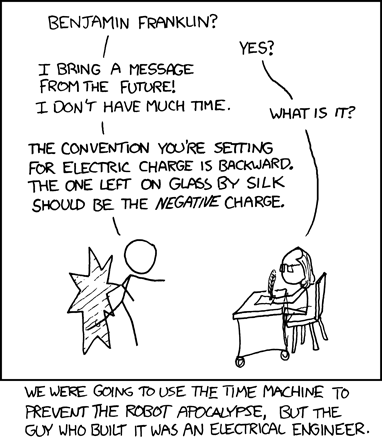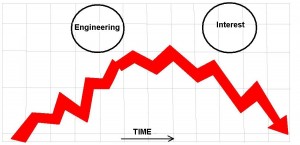I am not a perfectionist. I think of myself as too practical to be a perfectionist.
However, I find myself setting very high expectations for myself and I don’t feel I am alone. Generation Y has always been encouraged by parents and others every step of the way. We have been told we can do anything and more drastically, we can do everything. We have been multitasking since kindergarten and over-scheduled ever since. We played the most little-league sports, we took the private music lessons, we had the private language tutors, we were boy scouts. We had the most extra-curriculars on our college applications, we had the best grades we could, we took all of the AP classes and we applied to more colleges than we’d ever need to. We took the most engineering credits, studied as many hours as we could stand, we drank during the remaining hours and we graduated with as many minors as they let us. We had the most interviews as our schedules would allow, we got the most job offers, we had the biggest signing bonuses and we got the fanciest job. We expect the biggest promotions at work, the biggest pay raises, the best benefit packages and the best of everything.
Now what?
OK, I’m not saying I did all those things above, but some of them rang true. I’d be willing to guess there are a few readers out there in the same boat. And now that I’ve exited the goal driven world of school and extracurriculars, I still have the drive and I have the spirit, but there isn’t as much need for it. Yes, I try as hard as I can at work and that continues to be a focus of my efforts. But in the rest of my life there’s really no pressure to do anything if I don’t place it on myself. Some would say that this is a great thing! “You can relax now!”, they say. But it is more of a mindset that we place upon ourselves naturally. A few examples:
- I have recently started playing music again since fixing my Wurlitzer 200. I immediately expected to excel at playing once again with much less practice than I had during other times I was playing.
- When starting this and other blogs I immediately expected people to flock to my site to read what I had to say. I did not understand at first that the content that I write must be good enough for people to want to read it and that others must link to it for it to really be found.
- When I began investing some of my income a few years back I instantly expected the stocks and funds I picked to begin beating the S&P500, even though I had no experience. I mean, hey, I read some books!
- Every single time I (re)start weight training I end up hurting myself because I try to do the same amount I remember doing the last time or expect to be able to do even more.
- I expect to have great relationships with people I am close to, even though I spend time doing more frivolous things like checking Facebook or Twitter instead of being in the moment with those next to me. I expect to be connected with everyone and know what’s going one with everyone all the time.
I point out my flaws because I think they are natural reactions to some of these situations, if not unrealistic. Perhaps the same is true for the general population or perhaps they are more specific to the high-expectation crowd of Generation Y. The truth is that in all things, there are averages. In music and in new media and in investing and everything else, there is always an average, always a mediocre player. However, Generation Y was consistently exposed to the top .1% by parents and the media. We have always been told not only can we do anything and everything but that we will also be THE best at it. Am I being clear how this doesn’t make sense that so many people believe they can be so good at everything? No? Let me be clearer, using one of my favorite uses of (overly) simple statistics:
Think of how bad the average driver is on any given day. Half are worse than that.
It’s such simple terms to think in, but really MOST people are going to be average, right? Do you really think that you are as bad a driver as most people out there? I know most people I talk to think they are top notch.
The point here is that these skills and talents do not come without practice. You can’t just step in and become an expert at anything and everything just by starting to do something. But people in Gen Y continue to expect to do so. We have been told and we continue to hear stories of Wunderkinds, but we never stop to question the work those people had to do to get where they are. Think about it: how often does the nightly news report on the 4 year old that can play Mozart? And how many times does the same news show highlight the parent forcing the child to hold a violin at 6 in the morning and practicing 8 hours a day? I don’t mean to demonize the media because I understand they are just trying to get the story; but it only adds to the mystique of the no-work success.
So what happens when you tell an entire generation that they will be THE best (at everything) and they figure out that it might not happen? I think we haven’t even begun to see the beginning of how these attitudes manifest themselves in the public and online. Let’s list off some of the more obvious ways:
- Twitter — It can be used for good and for evil but I believe at least some of the popularity of the site stems from being able to show off how you are the “best” at whatever you’re doing. By showing your “uniqueness” on Twitter it allows people to believe they are different from the masses. Instead of taking time to concentrate on one subject and become better at it, our attention is again fragmented by constant updates and updates about minutiae.
- Facebook and all the rest of social media — I think one of the ways that Gen Y shields themselves from the realities of the world is by surrounding themselves by friends or “friends” in the case of people you connect with online but don’t really know that well. I think of if I ever formed a new band. If I got all of my friends to come out to a show, it’s likely they would say nice things after the show to me, even if I stunk up the house. I have nice friends. But really that’s shielding me from the reality that if I played the same music for a group of strangers, I’d get rotten tomatoes and zucchini thrown at me (do people ever really do that?). As a generation we surround ourselves with friends, quasi friends and complete strangers online in order to share our successes and get positive feedback. But doing that with everything in our lives can mask areas where we really need improvement.
- Social Isolationism — One major downside is that in expecting the best from ourselves we automatically become critical of others. This hinders our ability to go out and meet new people. The best way to connect with a person is to enter the new relationship with a sense of wonder…what does this person know, what can they teach me, etc. If we aren’t entering new social situations this way and instead we automatically instead begin looking for faults, then new relationships are doomed to fail. And then people go back to the social media tools listed above and end up isolating themselves more.
- Higher Quit Rates — Penelope Trunk often cites the fact that Gen Y changes jobs on average every 18 months; she also loves what this adds to the workplace dynamic. And while I don’t disagree that changing jobs more often can advance your career in certain ways (compensation, respect at a new job), I think that it is a trend that is likely to go down after a time (meaning people quitting after even less than 18 months). Even at a year and a half in a technical position, I am not sure that enough depth of knowledge is gained to really move on to another job. So people in Gen Y will start to move on to the next job quicker and quicker, expecting to excel at each without ever learning the system and without ever putting the time in to gain useful knowledge for themselves or their next position.
- Forgotten Blogs — You can find a lot of interesting things on the final pages of a Google search; most notable is the web garbage from those that had the same high expectations for a blog as I mentioned above. Pages upon pages of half-finished thoughts will sit there untouched until accounts go obsolete or the person gives it another shot. It’s natural for people to quit doing things; in fact doing it at the right time is a skill. But quitting simply because you are not instantly the best at something is not right, doubly so when you forget to remove your online record of it.
It will be interesting to see how these things will change over time. More than likely, new online services and activities will pop up that exacerbate the problems in Gen Y. Eventually I’m sure people will begin to see the virtue of putting the time in learning depth of a subject and not just breadth. Then expectations about being considered an “expert” will be more realistic.
It’s not hard to see this is a self-deprecating post. I do it as a slap to my own face and because I have found myself getting increasingly stressed over things in my life that aren’t all that important; the stress is derived from unrealistic expectations and not properly prioritizing the things I do on a daily basis. And I’m not saying that you shouldn’t strive to be the best in everything that you do, because in reality someone always does have to be in that top .1%. I just think more people should think about expectations they set for themselves and the time they allocate to activities in which they expect to be experts. Slowing myself down and re-evaluating how I set goals and expectations for myself is a healthy process and one I need to do to keep self-induced stress low.
What about you? Do you put a lot of pressure on yourself? Do you fall into the category of “Generation Y” or are you from a different generation? If so, how do you set expectations for yourself?












